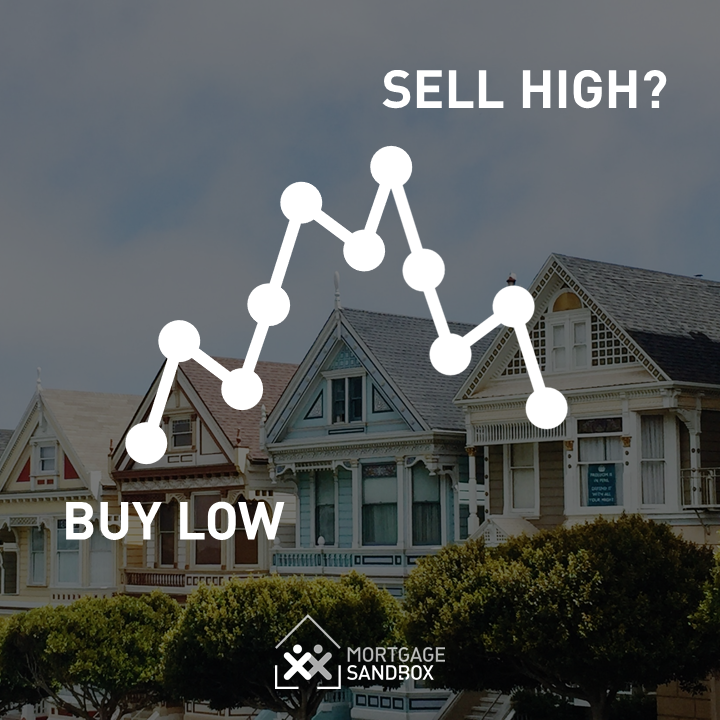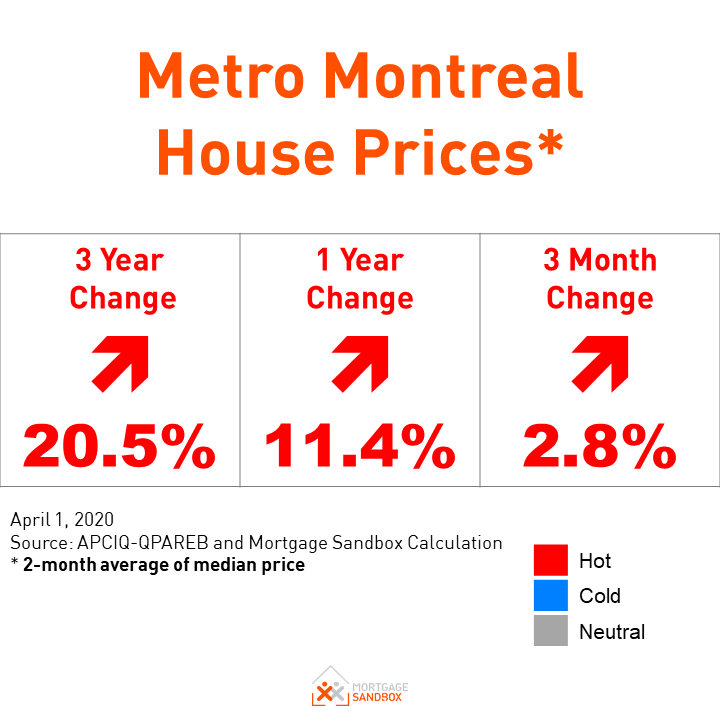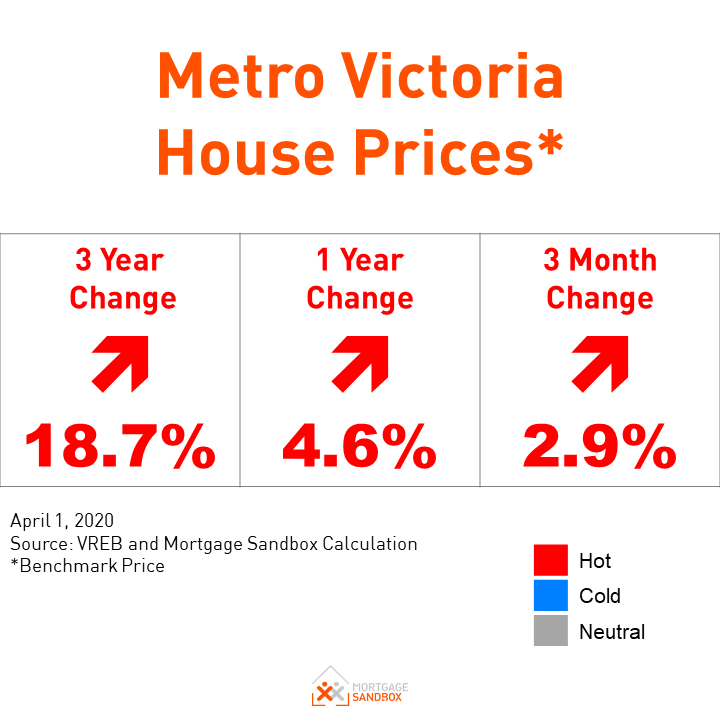Should I sell my home today?
Canadians who plan to live in their current home for the next ten years, as well as long-term investors, should never sell out of a sense of panic. The economy is in uncharted territory, and regardless of our job situation, everyone needs a place to live.
However, there are a few types of homeowners who should seriously consider selling during the pandemic. The following homeowners should consult an investment advisor, mortgage broker, and real estate agent to investigate whether selling their home today might be the best decision for their financial future and their quality of living.
Canadians in entry-level homes.
Older Baby Boomers whose home is their primary retirement savings.
Speculative real estate investors, home flippers, and spec builders.
Why would we recommend selling into a slow real estate market?
There is a risk that Canadian home prices will drop 20 to 50%
As an early indicator of the severity of a Coronavirus Recession, one in every ten Canadian mortgages is technically already in arrears, but because the government asked banks to allow 6-month payment deferrals they aren’t’ being reported as late payments, yet.
Many economists believe that the Coronavirus recession will be comparable to The Great Recession (2007-08 Financial Crisis) or The Great Depression. The International Monetary Fund (IMF) recently published a report titled, “The Great Lockdown: Worst Economic Downturn Since the Great Depression.” In that report, the IMF projects the Canadian economy, which had been projected to grow by 1% to 2%, will shrink by 6% this year.
Assuming the pandemic fades in the second half of 2020 and that policy actions taken around the world are effective, we project global growth in 2021 to rebound to 5.8% but it would be only partial. Read the latest #WEO https://t.co/93xXDRsg3B pic.twitter.com/OALih0reUO
— IMF (@IMFNews) April 15, 2020
Why are they making these comparisons?
The Great Depression (1929)
The Great Depression started in the United States after a significant stock market crash on October 29, 1929 (known as Black Tuesday).
Ironically, there is little consensus on what caused the stock market sell-off that markets the beginning of the Great Depression. One theory is that low interest rates created an asset bubble, and then there was a tipping point where people realized that those high prices where unsustainable.
Whatever the root cause, between 1929 and 1932, worldwide gross domestic product (GDP) fell by an estimated 15%. The Great Depression led to peak unemployment in the U.S. of 23%, and in some countries, unemployment rose as high as 33%. In most nations, the adverse effects of the Great Depression lasted almost a decade.
The Great Recession (2008)
The Great Recession was a cakewalk when compared to the Great Depression. During the Great Recession, worldwide GDP fell by less than 1% from 2008 to 2009.
The Great Recession was the result of a vulnerable financial system with too much high-risk debt that was toppled by a ‘trigger event’ that suddenly caused people to realize how risky the situation had become. When house prices began dropping in 2005–2006 with a strong economy, it marked the end of the United States housing bubble. The bubble bursting was the trigger event. The knock-on effects then revealed all of the risky behaviour that was taking place.
The Great Recession lasted from December 2007 to June 2009, and the unemployment rate reached 10% in October 2009. Interestingly, unemployment peaked four months after the recovery began. In many American cities, home prices took several years to reach their previous peaks, and in some cities, home prices took more than a decade to match the pre-recession heights. In a few unlucky cities, prices still have not recovered their value.
Canada came out of the Great Recession relatively unscathed. Toronto and Vancouver home prices were back to previous highs within two years.
The Coronavirus Recession
In December 2019, when the Coronavirus was brewing in Wuhan, China, the unemployment rate in Canada was 5.6%. Three months later, unemployment had climbed to 7.8%. The Coronavirus Recession will likely lead to peak unemployment of somewhere between 15 and 25%. Royal Bank has forecast Canada will reach 15% unemployment by the end of June, whereas the U.S. Fed’s ‘back of the napkin’ calculations show that most likely 30% of Americans will be unemployed at some point, and in a worst-case scenario, the U.S. will reach 40% unemployment. To be conservative, we will assume that Canada’s public health care system will lead to better economic results than in the U.S.
My tech guys put together this amazing animation showing the magnitude of the COVID19 job losses in Canada last month pic.twitter.com/fb24eYEmur
— Ben Rabidoux (@BenRabidoux) April 11, 2020
Brendan LaCerda, a Senior Economist with Moody’s Analytics, has modelled the impact of a downturn on home prices. Moody’s Model roughly translates a 1% rise in unemployment with a 4% drop in home prices. Based on this ratio, they must be looking at the lower unemployment scenarios. It is unlikely that Moody’s calculation can fully take the social distancing measures into account. Banning open houses is unprecedented, so really, Moody’s estimated impact is an intelligent guess.
Using Moody’s impact multiple, if the Canadian unemployment rate rose from 6% at the end of 2019 to 11% at the end of 2020, then home prices should drop by 20%. If unemployment were to rise to 16% by the end of 2020, then home prices could fall by 40%.
Moody’s analysis is helpful, but real estate is local. In the Great Recession, the impact on home prices in every city was different. For example, Miami home prices dropped 50%, Los Angeles values fell 41%, San Francisco lost 36%, and New York City declined 27%. Canadian home prices were less impacted, and Toronto values only dropped 7%, while Vancouver prices fell 14%.
The lesson we should take from the Great Recession is that even though every city will be impacted differently, every city was impacted.
The severity and duration of the impact will depend on:
How vulnerable is the local labour market to the COVID-19 containment efforts?
Are there external sources of demand (e.g., foreign speculative investors) to support demand?
Although the Coronavirus Recession will lead to higher unemployment much more quickly than the Great Recession, this time, the Canadian government is spending much more to support the economy with fewer strings attached.
Nevertheless, there is a risk that home prices in some Canadian cities may drop as much as 50% and that it may take one or two decades for prices to recover. In a best-case scenario, home prices fall as little as 10% and recover a couple of years later. Industry pundits will debate how much and for how long house values will drop, but there’s a consensus that prices will drop.
Are you sure prices will drop? Might the market just slow down?
Prices tend to drop in a recession because all but a few buyers when faced with market uncertainty, will choose a ‘wait-and-see’ strategy. However, not all sellers can brave the risk of a potential drop in prices. That is why, in general, sellers will be more motivated than buyers in a recessionary real estate market.
In the Metro Toronto condo apartment market, where open houses were banned in the last week of March, we can already observe that purchases are already weakening while more condos are for sale. If this trend persists, it will shift more negotiating power from sellers to buyers.
Should I sell my home today?
Consider the scenario. If it makes you uncomfortable, then you should consider selling.
December 2020 – Wave 3 of Social Distancing Ends
(9 months since the first lock-down)
After the three waves of infection, Canada’s population has shrunk by 1.5%. Unemployment stands at 15%, and we have not yet lifted the travel ban, nor have we welcomed many new immigrants to Canada.
Immigration is on hold, except for medical professionals, because politicians feel that the electorate does not want to see a lot of immigration until employment prospects improve for existing Canadian residents.
Your home is worth 25% less than it was 9 months ago, and prices are continuing to drop.
All vulnerable individuals, who comprise more than 30% of Canadians, are still in full lock-down (e.g., individuals who suffer from obesity, heart conditions, high blood pressure, diabetes, pre-existing respiratory conditions, and people aged 65 years and over). Many workers, in their 60s or older, have been laid off and effectively forced into early retirement. They will not show up in unemployment statistics because technically, they are retired.
September 2021 – Vaccine is Available
(18 months since the first lock-down)
A vaccine finally gets approved in June 2021. By September, it is mass-produced and distributed to Canada’s most vulnerable residents.
December 2021 – Home Prices Stop Dropping
(21 months since the first lock-down)
Vaccinations have been underway for three months, and employment is improving. The trough in home prices is reached in January 2022, two years after the pandemic began. Houses have lost 50% in value since 2020, while apartments have shed 30%.
Home prices begin to rise slowly at first. Many people would like to ‘up-size’ from their ‘starter-home,’ but they have negative equity in their home, and they used up a lot of their savings during the Coronavirus Recession.
Immigration is growing slowly, and population growth is still low.
Home values finally begin to accelerate as employment climbs, and existing homeowners build up equity.
March 2030 – Home Prices Rise to 2020 Values
(10 years since the first lock-down)
Finally, in 2030, home prices return to the levels from March 2020.
Does a 50% drop in home values with full recovery in 10 years bother you?
If you are living in your ‘dream home’ already, and you plan to live in it for the next 10 to 20 years, the scenario above should not bother you.
However, some homeowners likely will be concerned by this scenario.
Older Baby Boomers whose home is primary retirement savings
According to a 2018 Royal LePage survey, 1.4 million Baby Boomers expected to sell their home and buy a new property by 2023.
Canadians who are relying on their home as their primary source of retirement savings should think carefully about when they will need money out of their home. They may benefit significantly by selling now, slightly below the most recent peak, rather than waiting a decade to access their savings. ‘Down-sizing’ or ‘right-sizing,’ as we prefer to say, might be a great way to shelter your retirement savings from a potential prolonged real estate downturn.
We prefer the term ‘right-sizing’ because most people who sell a house to move into an apartment these days tend to buy large luxury condos that are newer and nicer than the homes they sold. They include shared amenities like gyms, pools, and party rooms. Although they may have a slightly smaller square footage, these new condos are a step up for most Boomers.
Speculative real estate investors, home flippers, and spec builders
"Buy low, sell high" is probably the most well known adage for making money, and we are presently at a price peak.
We believe that investors, home flippers, and builders, who are relying on property appreciation to justify their investment, can not risk a significant and prolonged price drop.
If they can sell in May at a 5% discount from the peak, then they will be better off than paying the mortgage interest for two to ten years while waiting for better prices.
The urgency is even more relevant for the most speculative investors who have used a private lender to finance their purchase because private lenders charge much higher interest than banks, and they may get cold feet and ask for their money back at the earliest opportunity.
People in Entry-Level Homes
These are first-time homeowners who have less than 20% equity in a ‘starter home’ and are hoping to upgrade in a few years when they grow their family. If prices drop by 20%, they will have no equity to help with the purchase of their second home.
If prices fall by 25%, then their mortgage could be larger than the value of the home. The negative equity would prevent them from selling their current home. They would effectively be locked into their starter home until home prices recover. Possibly in 10 years.
What Should You Do Next?
If you fall into one of the categories above, you should set up a video call for professional advice immediately.
Consult an investment advisor to run through the best, worst, and most likely scenarios. Work through a full financial plan, taking each of those scenarios into account. Ask about the pros and cons of selling your home in the context of your financial plan.
Get advice from a mortgage broker to understand the total costs of paying off your mortgage early. Repayment costs generally include an early repayment penalty and some legal fees, but there are often tricks to reduce your costs.
Talk to a real estate agent to get a feel for the market conditions in your neighbourhood. Real estate is local, so you need a competent agent with in-depth local knowledge.
If the Coronavirus Recession is worse than the Great Recession and selling today could put an extra $50,000 to $200,000 in your pocket when compared to a wait-and-see approach, you owe it to yourself to investigate your best option.
At a minimum, while you consult the professionals, start to get your home ready to sell. That way, you will be prepared to move quickly if you decide to sell. Here are some tips to help you prepare your home for a sale.
Alicia Ryan, a Calgary real estate agent says, “we're telling our clients to hold off until things settle down a bit." Our concern with this advice is that by the time things ‘settle down,’ prices might be significantly lower.
Need a local Realtor?
We help Canadians find
pre-screened, local Realtors with whom they’ll be predisposed to work well.
Like this post? Like us on Facebook for the next one in your feed.












